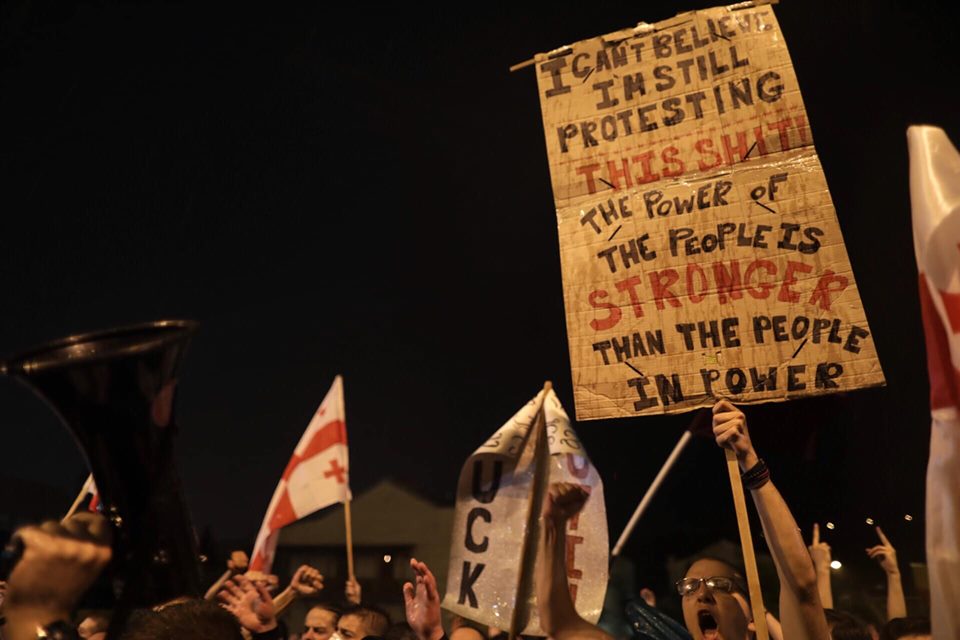The protest rally outside the Parliament of Georgia resumed at 7pm on June 25. As one demand – changing of the election system to a fully proportional one – has been conceded by the ruling party , the rally now focuses on holding to the account those responsible for June 20-21 police brutality. They have called for the Interior Minister Giorgi Gakharia to step down, and for those individual police officers who used excessive force to be detained.
Georgian Dream toughens tone
After five days of virtual silence, broken by GD leader Bidzina Ivanishvili’s announcement on the conceding on election system, the ruling party and the government sprung into action to regain some lost political ground.
The crux of the attack fell on “destructive” opposition leaders, especially from the United National Movement (UNM), the ruling party’s arch-enemy.
On June 25, the Prosecutor’s Office reported that it has requested the Parliament of Georgia to lift immunity from an opposition MP Nika Melia (UNM) charging him for the criminal offense of inciting and heading mass violence on the night of 20-21 June on Rustaveli Avenue. The investigation has been launched article 225 of Georgia’s Criminal Code.
Earlier on June 25, as the Parliament session has re-opened, Georgian Dream MPs launched a broadside attack against the opposition leaders accusing them of staging incidents and inciting peaceful protesters during the night of June 20-21.
Another element of the majority MPs was to ring-fence Interior Minister Giorgi Gakharia, who has not appeared in public since the start of the protests. GD MPs claimed, that police acted within its mandate, while admitting isolated cases of excessive use of force. They also said the Interior Minister “averted bloodshed” in the country.
Freshly elected Parliament Speaker Archil Talakvadze said from the Parliament rostrum on June 25 that “a particular political group” had tried to turn “a peaceful rally into an act of aggression,” plotting “to overrun the police cordon and storm the Parliament of Georgia.”
“Lots of questions should be answered by those opposition leaders, who were on the front-line of developments. All of them will have to answer,” Talakvadze said, adding that the government will not allow anyone “to achieve any changes in the country through violence”
MP Mamuka Mdinaradze, leader of the Georgian Dream parliamentary faction, also spoke about the opposition’s responsibility for the June 20-21 developments, saying that all those persons, who are staging provocations “should be held accountable.”
In the interview with Georgian Public Broadcaster on June 25, Prime Minister Mamuka Bakhtadze also raised the UNM’s responsibility for the June 20-21 developments, saying that the opposition party tried to ride the wave of sincere protest and use it for staging provocations.
“The Parliament building was under attack, police officers were subjected to violence; so, they had to use (…) special means [of crowd control] to disperse a group of aggressive people,” he said.
The Prime Minister noted that over the past years, UNM and its leader are bent on inciting instability . “They do not accept any democratic process, any elections conforming to the highest standards. They are bent on polarizing the public, on splitting and destabilizing the country,” Bakhtadze said.
Irakli Garibashvili, Georgian Dream’s political secretary, said in the interview with TV Pirveli yesterday that the government will never tolerate violence against institutions, and will react forcefully. He stressed that Interior Minister Giorgi Gakharia continues to enjoy full support of the GD team.
Garibashvili claimed on June 20 the government “averted a coup”, stressing that “anti-national, anti-state force, the [United] National Movement staged a very dangerous provocation.”
“They decided to occupy the Parliament building using force. They organized mass violence against the state and police. Why do not we speak about it? How did we come to it? During three years our police officers were enduring and repelling unimaginable insults and physical violence from Saakashvili-hired criminals,” he said.
Tensions mounted around 10pm Tbilisi time on Thursday, when part of the protesters tried to break through the first cordon of the police, but were pushed back by the riot police.
Situation remained tense overnight. 240 people, including 80 police officers and 12 journalists have been treated for injuries. Many severe injuries to civilians occurred later during the night after the police has dispersed protesters through massive use of tear gas and rubber bullets, including so called “less-lethal” rounds. Three people remain in critical conditions, due to wounds caused by the rubber bullets.
This post is also available in: ქართული (Georgian) Русский (Russian)

